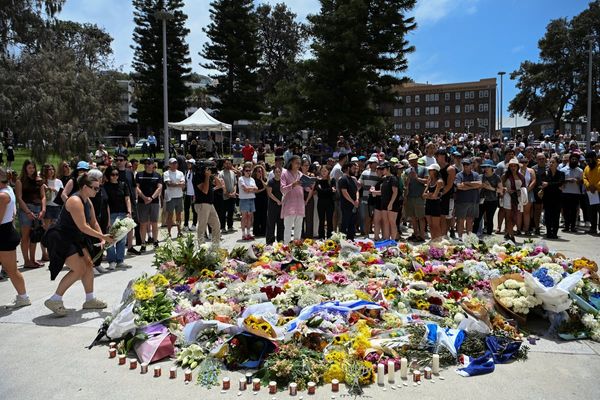
A new Conservative attack advert appeared on Friday, showing Keir Starmer with his head bowed next to a triumphant-looking Mick Lynch, leader of the RMT rail strikes, and Angela Rayner’s smiling face in between them.
It showed the party once again reaching for its old union-bashing comfort blanket that worked for Margaret Thatcher, and to an extent, for some subsequent leaders such as David Cameron against Ed Miliband and Boris Johnson versus Jeremy Corbyn.

But not all Conservative MPs nor its strategists believe that this demonisation of Labour by linking the strikes to supposedly unpopular unions will work. Nor is it an easy assumption that the public are anti-strikes, with opinion polls suggesting strong although slightly declining support for the nurses’ strike rather than the government’s position of refusing to negotiate over pay.
“It’s high risk,” said Giles Kenningham, a former No 10 press secretary and ex-director of communications for the Conservative party, who now runs Trafalgar Strategy. “I think strikes are much more of a political timebomb for the Tories. It’s easier when you just take on one union but this is multiple strikes, the public are going to say: ‘We don’t care, just sort it out’.
“Because Labour have taken a more nuanced position and are looking more like a government in waiting, it is harder to make that link. Public sentiment and sympathy is always probably going to be with the nurses over politicians.”
He also said the world was a different place to what it was in the past when the economy was strong. “You’ve had 12 years of Conservatives, with the cost of living crisis, inflation and the backdrop of Britain’s not working. It’s harder to make the arguments,” he said.
The first rumblings of discontent about Rishi Sunak’s strategy emerged among Conservative MPs this week, with at least four MPs – Steve Brine, Robert Buckland, Daniel Poulter and Jake Berry – suggesting now was the time for ministers to get around the table to head off more nurses’ strikes and the even more disruptive ambulance strikes in the coming days. While there is little sympathy among Tory MPs for an above-inflation 19% increase requested by the Royal College of Nursing (RCN), many think there is a landing zone somewhat higher than the 4.3% average offered to qualified nursing staff after a recommendation from the pay review body.
Anne Milton, a former Conservative health minister and ex-nurse, also joined those saying on Friday that it was time for the government to negotiate and settle with the nurses and other workers.
“In terms of public perception, there’s a battle going on about who is more worthy than the others. But the government should step in now to stop [the strikes] as I think they would settle now. The government’s failure to talk to them just looks really bad. I think the government should get around the table,” she said.
Behind the scenes, there was also frustration among Conservative MPs about the “lack of a plan” for what happens if the health strikes continue and public frustration rises at the government’s refusal to reopen talks on pay. “Where does it go next? There’s no sense that they’ve thought about what happens now they’ve backed themselves into a corner on sticking to the pay review body’s recommendation,” one Conservative backbencher said. “You can sense there will be a U-turn incoming if this situation worsens.”
Others were sceptical about the diplomatic abilities of Steve Barclay, the health secretary, who is considered a technocrat and details man rather than someone renowned be able to smooth over disputes.
There is no sign yet that either Sunak or Barclay are changing course. Both have been at pains to appear reasonable, with the prime minister stressing that they were happy to be “constructive” and talk about anything apart from reopening last year’s pay settlement.
However, trade unions have been able to land the argument that ministers are not really entering discussions if they are refusing to talk about pay. Opinion polls suggest the public is still behind many workers taking industrial action during a cost of living crisis, with 63% supportive of the nurses’ strike compared with 25% opposed, according to the most recent figures from Savanta.
The changing face of trade unions away from the stereotype of tub-thumping male leaders from the 1970s may have played a part in this softening of public sentiment, one senior trade union leader said. While Mick Lynch of the Rail, Maritime and Transport workers’ union (RMT) may fit the more traditional model, a new generation of powerful new female leaders of trade unions are also at the forefront of industrial action including Christina McAnea of Unison, Sharon Graham of Unite, Frances O’Grady of the TUC and Pat Cullen of the RCN.
Nor is Starmer dealing with strikes in the same way as some of his predecessors, making clear that he supports negotiated settlements but declining to join workers on the picket lines, despite many of the unions involved – Unite, the GMB and Unison – being major donors to the party. Furthermore, two of the biggest unions involved in the strikes – the RMT and the RCN – are not affiliated to the party, making it harder for the Conservatives to make an argument about Labour being in the pocket of union barons.
Berry, a former Tory party chair, told Times Radio on Friday that this sort of “chest-beating” anti-union politics no longer worked, and that “pragmatism” would be more respected as a strategy.
But his successor in the role, Nadhim Zahawi, clearly does not agree. Along with the attack ads, he tweeted just hours later: “Keir Starmer either cannot or will not stand up to his union mates causing strike chaos across the country. It’s Labour’s nightmare before Christmas delivered with their pal Mick ‘Grinch’ Lynch.”
It seems more likely, though, that the blame will be laid at Sunak’s door.







